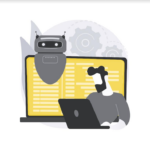As the world becomes increasingly interconnected and automated, the demand for AI skills continues to grow. Today, we’ll explore how fostering AI skills in children can provide them with a competitive advantage and set them up for success in future careers but for this purpose you have to discover the courses related to AI which will benefits you in future in your career.
The Growing Influence of AI
Artificial intelligence is no longer confined to science fiction; it’s now an integral part of our daily lives. From virtual assistants and recommendation systems to self-driving cars and medical diagnostics, AI is reshaping various aspects of society. As industries incorporate AI-driven solutions, understanding and working with AI tools will be essential for the workforce of tomorrow.
Why Introduce AI Skills Early?
Children are like sponges, absorbing knowledge and skills at a remarkable pace. Introducing AI concepts to kids at an early age can provide them with a solid foundation for the future. Here are several reasons why incorporating AI education into children’s learning journey is crucial:
- Cultivating Critical Thinking: AI encourages children to think critically and solve problems. Programming AI models or designing algorithms necessitates breaking down complex problems into manageable components—a skill that’s valuable across disciplines.
- Enhancing Creativity: AI technologies like generative art and music algorithms can spark creativity by offering novel ways to express ideas. Children exposed to such tools can explore their imagination and develop innovative thinking.
- Fostering Adaptability: As AI evolves, so do its applications. Familiarity with AI concepts prepares children to adapt to technological shifts, equipping them to excel in an ever-changing job market.
- Building Digital Literacy: AI education introduces children to coding and data analysis, enhancing their digital literacy. These skills are becoming as fundamental as reading and writing in today’s technology-driven world.
- Promoting Ethical Understanding: Teaching AI ethics alongside technical skills empowers children to create responsible and socially conscious AI applications, ensuring that the technology benefits humanity.
AI Skills and Future Careers
The influence of AI extends to virtually every career field, offering unprecedented opportunities for those who possess AI skills. Here’s a glimpse of how AI expertise can benefit children’s future careers:
- Medicine and Healthcare: AI-powered diagnostic tools can aid doctors in identifying diseases more accurately. Children with AI skills could develop innovative medical technologies that revolutionize patient care.
- Environmental Science: AI plays a pivotal role in analyzing vast environmental datasets. Future environmental scientists equipped with AI skills can devise sustainable solutions to global challenges, such as climate change and resource depletion.
- Entertainment and Media: AI is already influencing content creation, from personalized movie recommendations to computer-generated special effects. Children skilled in AI might shape the future of entertainment by creating immersive experiences.
- Business and Finance: AI-driven algorithms are transforming financial analysis and decision-making. Children proficient in AI can develop algorithms for predicting market trends and optimizing investment strategies.
- Transportation: The development of self-driving vehicles relies heavily on AI. Young minds with AI skills could lead advancements in transportation, making travel safer and more efficient.
- Education and Learning: AI-powered educational tools personalize learning experiences, catering to individual needs. Children with AI skills might design educational platforms that adapt to each student’s unique learning style.
- Agriculture: AI-enhanced precision farming techniques maximize crop yields and minimize resource wastage. Future agricultural experts proficient in AI could address food security challenges.
- Space Exploration: AI is crucial for processing data from space missions and enabling autonomous spacecraft. Children with AI knowledge could contribute to groundbreaking discoveries in space exploration.
Teaching AI Skills: Approaches and Resources
Introducing AI skills to children doesn’t require advanced degrees or specialized training. Various approaches and resources can help parents and educators nurture AI proficiency:
- Educational Kits: AI-focused kits and toys introduce children to programming and robotics in an engaging manner. Brands like LEGO and Makeblock offer kits that teach coding and AI concepts.
- Online Courses and Platforms: Websites like Code.org, Khan Academy, and Coursera offer AI-related courses suitable for various age groups. These platforms make learning interactive and accessible.
- AI Programming Languages: Familiarize children with AI programming languages like Python. Resources like Scratch and Blockly offer simplified coding environments for beginners.
- AI in Everyday Life: Encourage children to explore AI in their daily lives, from voice assistants to image recognition apps. This hands-on experience enhances their understanding of AI concepts.
- Hackathons and Competitions: Participating in AI-related hackathons and competitions exposes children to real-world problem-solving and teamwork, building practical skills.
Conclusion
The future is brimming with possibilities, and AI is at the forefront of innovation. Equipping children with AI skills today prepares them to lead and thrive in tomorrow’s job market. As AI continues to reshape industries, fostering critical thinking, creativity, and adaptability in children will be instrumental in shaping a brighter future. By embracing AI education, we empower the next generation to harness the power of technology for the betterment of society as a whole.








